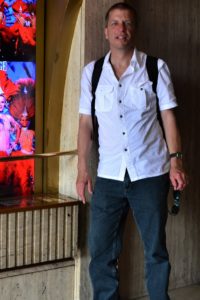Journeys to Humanism: Shaping My Own Guiding Philosophy

Journeys to Humanism, theHumanist.com’s regular series, features real stories from humanists in our community. From heartwarming narratives of growth, to more difficult journeys, our readers open up about their experiences coming to humanism.
Rich Nelson
Muskegon, Michigan
My journey to humanism began within the confines of my childhood church. From there, it became a path forward built upon revelations that alienated me from religious credence, and culminating in the discernment that I was good without a god. There was a myriad of pieces that constituted this journey, and I struggled early on to compile the pieces into a coherent whole. Those bumpy travels led me to humanism, an ideal fit in my adult years as I shape a philosophy to guide my life.
It was yet another Sunday morning of my youth. The year was 1964, my twelfth year. As far back as I can remember, attendance at church was the expectation. Our family’s commitment to the church extended beyond that morning; it followed us through the week. Deacon and guild meetings and Wednesday evening choir practice added to my parents’ calendar, while my church world revolved around Sunday school, junior choir, and weekend retreats. Though I realized this robust schedule brought comfort and security to some, I recognized it, as time went on, as something we just did, duties performed essentially in a robotic manner.
At home, our family did not express that same commitment to religious practice. No one offered prayer before dinner. A bible was not readily available for study or reflection. God was not sought out for inspiration or strength in challenging times. Despite our church obligations, there was no depth to our faith. We were conforming to standards set by community and church, and it just didn’t connect with me. We seemed to be going through the motions that were expected of us, week after week.
Religion has proven to be a driving inspiration in fashioning my values, although in ways the church of my past would not have looked kindly upon. I did not fully grasp, at first, the hypocrisy within that church setting. I was twelve when I first sat with the adults for a Sunday service, on the invitation of my grandmother, skipping Sunday School in the downstairs classroom for the first time. I recall the basic message of the minister’s sermon that morning, a preaching of loving your neighbor. Parishioners nodded in approval.
After the service, I wandered through the social hour in the church’s reception area and overheard snippets of adult conversation. At that young age, I failed at first to grasp the disconnect between the sermon’s plea for tolerance and the social conversations that followed, peppered with racist remarks. I recall that the words I heard, and the tone in which they were delivered, made me uncomfortable, but I did not quite yet know why.
It was the early ‘60s, the onset of turbulent racial strife in this country. Some who gathered for coffee and cake after the service offered their intolerant views of the American scene. The bigotry became more apparent as I moved through my school years. I walked away from the church.
My journey of coming out as a gay man has also drawn me to humanism. My struggle to come out was at first dictated by the external voices heard in my early years, declaring homosexuality abnormal, freakish, a sin, an abomination. Many lent a hand to such declarations: disparaging stereotypes of queer men populating the television and movie screens of that era, homophobic taunts by the gym class jocks of my school years directed at the non-athletic students, and the strong condemnation of homosexuality emanating from the church.
These voices conflicted with my sexuality, and I buried those feelings for a long time in fear of being ostracized, or worse, by family and peers. I had nothing and no one to help process this awakening, no frame of reference to guide me through my emerging feelings. The church–and my school–offered nothing to counter the belittlement toward those perceived as gay. The hypocrisy once again showed its ugly face, a divide reaching epic proportions between a sermon’s message of love and the vile renouncements of being gay.
It should be noted, many churches have become welcoming congregations, embracing their LGBTQ members. And many resources are now available for gay youth. But religious intolerance in many quarters still harms, still holds back those desirous of embracing their true selves.
Coupled with the hypocrisy, I developed a growing skepticism of an existence of a supreme being. The basic creed of humanism, “a rational philosophy informed by science, guided by reason, inspired by art, and motivated by compassion,” has resonated in ways religious and spiritual tenets never did. “Affirming the dignity of each human being” is a humanist principle that rings pure and true.
I found my way.
We all have our own stories of how we came to be humanists, and we want to hear yours! Fill out the form here to be featured in this series.
